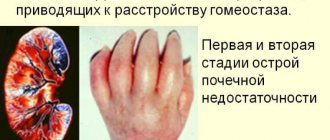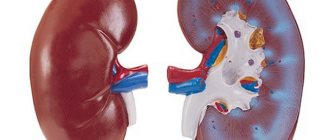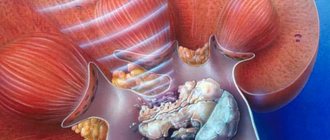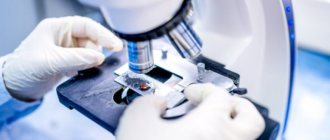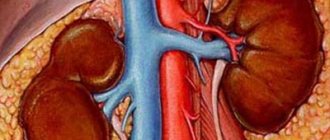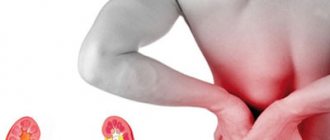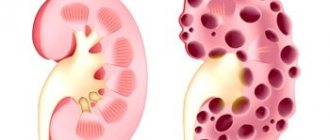The human body is a complex mechanism, consisting of many systems, which, in turn, are closely interconnected. Their connection resembles a vicious circle; as soon as one of the chains fails, the entire system undergoes colossal changes, often leading to death. This risk group for life includes the genitourinary system, or more precisely the kidneys. They filter the blood, cleansing it of all toxins and waste products of internal organs.
As soon as the kidneys die or temporarily stop their physiological activity, an acute form of renal failure quickly begins, quickly turning into the chronic stage. The latter is a serious consequence, leading to irreversible processes not only in the functioning of the kidneys, but also in all internal organs.
Provoking factors of renal failure
There are many factors that cause kidney failure:
- Reduced blood output.
- Decrease in the volume of extracellular fluid.
- Long-term decrease in blood pressure.
- Atherosclerosis of the arteries in the kidneys.
- Toxins.
- Inflammatory process.
- Excessive use of certain medications.
- High levels of myoglobin and hemoglobin in the blood. The reasons for high hemoglobin in men can be found here.
- Mechanical disturbance of urine transfer.
And also when:
- a decrease in the volume of blood that is ejected from the heart, accompanied by a change in heart rate; The normal heart rate can be found here
- tamponade, which causes fluid to accumulate in the pericardial sac;
- heart failure, which is characterized by disruption of the functions and supply of organs with a normal amount of oxygen.
Causes
Kidney destruction is usually observed in men after 40 years of age. But recently, the age of patients who need the help of a urologist has decreased significantly. This is due to bad habits, poorly purified water, and genitourinary diseases.
Causes of acute renal failure:
- kidney inflammation;
- drug use;
- smoking and alcohol abuse;
- various poisonings, including alcohol;
- collapse (fall in blood pressure and deterioration of blood supply to vital organs), state of shock;
- difficulty urinating;
- diseases caused by various infections;
- injury or forced removal of an organ.
Causes of the disease in chronic form:
- tissue necrosis of a weakened kidney;
- prostate oncology;
- diabetes mellitus and gout;
- blockage of the urethra;
- congenital kidney defect;
- pyelonephritis and glomerulonephritis;
- rheumatic disorders such as dermatosclerosis and lupus erythematosus.
Acute failure: signs and symptoms
Symptoms of acute renal failure develop very quickly.
initial stage
For infectious diseases:
- Feverish state;
- Chills;
- Discharge of mucus in the nose;
- Pain in the head and muscles.
For intestinal infections:
- Severe nausea;
- Diarrhea;
- Headache.
Sepsis - intoxication:
- Jaundiced color;
- Anemia;
- Convulsive state.
shock :
- Confusion or loss of consciousness;
- Pallor;
- Sweating;
- Poor pulse;
- Low pressure.
Acute glomerulonephritis:
- Blood discharge;
- Lower back pain.
All these are the reasons for the appearance of the first stage of renal dysfunction.
Second stage
Symptoms of the second stage:
- Urine excretion sharply decreases or stops;
- Azotemia (itching of the skin and loss of appetite, as well as nausea);
- Impaired consciousness;
- Weight gain due to accumulated fluid;
- swelling of the face or ankles;
- Edema of the brain and lungs;
- Accumulation of water in the pleura, pericardium, abdomen;
- General poor condition.
Third stage
Symptoms of the third stage:
- Lack of air, cough, foamy discharge;
- Hemorrhages in the skin, hematoma, bleeding;
- Drowsiness;
- Spasms;
- Arrhythmia.
Complete recovery can be expected when treating the first stage of renal failure, and in the second stage, with a good outcome, after a certain time the time for diuresis to be restored comes. At first, urine comes out in small quantities, and then the amount increases. Then the removal of waste containing nitrogen begins.
general information
Kidneys perform an important function in the human body. They continuously produce urine, which subsequently removes harmful substances. This filter structure ensures that two balances are maintained in balance: water-salt and acid-base. Renal failure is a dangerous pathological condition characterized by massive death of nephron cells. Subsequently, the body loses the ability to form and excrete urine. The disease is a consequence of acute damage to organ tissue and therefore develops suddenly. The volume of urine produced decreases sharply, sometimes it is completely absent. It is very important to promptly recognize the symptoms of kidney failure in men in order to prevent complications. The sooner the doctor prescribes treatment, the higher the chances of recovery.
How to recognize the disease?
The disease can be recognized by the following symptoms:
- See if there are any changes in urine output. Both acute and chronic forms often resolve with an increase or decrease in diuresis. Thus, chronic causes urinary incontinence and there may be a recurrence of urinary tract infections. Damage to the renal tubule can lead to polyuria. And this is too much urine production, which occurs at the beginning of insufficiency. The chronic form causes a decrease in daily volume. Other changes include the following:
- Proteinuria: proteins pass into the urine. It makes her foam.
- Hematuria: Dark urine is the result of the presence of red blood cells. If your child has been diagnosed with microhematuria, the causes can be explored here.
- Watch for sharp sensations of tiredness. Fatigue and anemia are signs of this condition. When oxygen levels decrease, a person feels tired and cold. And the kidneys produce a hormone that causes the production of red cells. In a pathological condition there are fewer of them, which is where anemia appears.
- Look at the swelling of the body. Edema is edema, or in other words, an accumulation of fluid that occurs during acute or chronic insufficiency. If it doesn't work well, the cell accumulates fluid. Very often, swelling appears on the arms, face, and palms.
- Dizziness or decreased attention. Dizziness and decreased attention, as well as apathy, are caused by anemia. And this is due to the poor supply of red cells.
- The appearance of pain in the upper back and legs. The presence of cysts in the kidneys can cause this condition. This happens because the cysts accumulate toxins. Which damage the nerves, and this, in turn, causes pain in these places, but pain can also appear in the sides.
- See if there is shortness of breath or bad breath. When the kidneys work poorly, the release of metabolic end products begins. These substances affect the body. As a result, the lungs begin to compensate for this deficiency by breathing frequently. After all, the level of carbon dioxide is high. In addition, liquid appears in them, which purely mechanically causes difficulty breathing. The lungs cannot stretch well.
- Itching is the cause of chronic deficiency. Pruritis is caused by this condition, also known as itching. And it begins due to phosphorus in the blood. If the kidneys have not lost their functions, then phosphorus is excreted from the body, and if lost, then it remains and crystals of this substance remain on the skin.
Understand that there may not be a noticeable sign, so consult a doctor!
Editor
Update date: 08/18/2018, next update date: 08/18/2021
If you find an error, please select a piece of text and press Ctrl+Enter.
Chronic renal failure (CRF) is a complex of symptoms that develops as a result of an irreversible progressive decline in kidney function, caused by a decrease in the mass of their active parenchyma, characterized by a shift in the parameters of homeostasis regulated by these organs with accompanying metabolic disorders and the development of pathology of a number of systems. Every year, 5-10 new cases of this condition are registered per 100,000 people, and the overall prevalence is 20-60 per 100,000. Chronic renal failure in men occurs and is treated in the same way as in women.
CKD is the outcome of various chronic kidney diseases (CKD). Until 2007, CKD was understood as chronic renal failure.
Kidney disease is considered chronic if pathology in urine tests and/or biochemical blood tests, changes in the structure and/or function of the kidneys are observed for 3 or more months. Detection of organ abnormalities by imaging methods (ultrasound, CT, MRI, etc.) is sufficient to confirm CKD, even with normal laboratory parameters.
A decrease in glomerular filtration rate (GFR) to 60 ml/min/1.73 m2 (normally more than 90 ml/min/1.73 m2) is also regarded as a sign of the disease.
CRF can be the outcome or consequence of many kidney diseases, both primary (glomerulonephritis, etc.) and secondary (diabetes mellitus, arterial hypertension, etc.). The latter are by far the most common cause of chronic renal failure in adults (both men and women). Main causes of the disease:
| Causes | Pathologies |
| Inflammatory | Chronic glomerulonephritis, chronic pyelonephritis, kidney damage due to systemic connective tissue diseases (rheumatoid arthritis, systemic lupus erythematosus, systemic sclerosis, hemorrhagic vasculitis, necrotizing vasculitis), malarial nephropathy, tuberculosis, HIV nephropathy, schistosome nephropathy, etc. |
| Metabolic and endocrine | Diabetes mellitus, gout, amyloidosis, idiopathic hypercalciuria, oxalosis, cystinosis |
| Vascular diseases | Malignant hypertension, renal artery stenosis and ischemic nephropathy |
| Hereditary and congenital kidney diseases | Polycystic disease, segmental hypoplasia, Alport syndrome, reflux nephropathy, Fanconi nephronophthisis, hereditary onychoarthrosis, Fabry disease |
| Obstructive nephropathies | Urolithiasis, tumors of the urinary system, hydronephrosis, genitourinary schistosomiasis |
| Toxic and drug-induced nephropathies | Use of cocaine, heroin, increased amounts of alcohol, cyclosporine, analgin. Toxic effects of lead, cadmium and radiation |
The basis of chronic renal failure is the replacement of damaged organ parenchyma with connective tissue (nephrosclerosis). When more than 50% of the nephrons (structural and functional units of the kidney) die, the remaining ones take over their function. As a result, they become overloaded and die. All this leads to the fact that over time the number of remaining nephrons (usually less than 10%) is not able to ensure the vital functions of the body, and without external blood purification the patient dies.
Symptoms of chronic renal failure can be grouped depending on the damage to various organs and systems. Manifestations include:
- asthenic syndrome – weakness, fatigue, drowsiness, decreased hearing, taste;
- dystrophic syndrome - dry and itchy skin (release of urea crystals), traces of scratching, weight loss up to cachexia, muscle atrophy;
- gastrointestinal syndrome - thirst, bitterness and unpleasant metallic taste in the mouth, lack of appetite, heaviness and pain in the epigastric region after eating, alternating diarrhea and constipation, bleeding from the digestive tract, stomatitis, mumps, enterocolitis, pancreatitis, impaired liver function;
- cardiovascular syndrome - shortness of breath, pain in the heart, arterial hypertension, left ventricular myocardial hypertrophy, attacks of cardiac asthma, pulmonary edema, pathologies of heart rhythm and conduction, uremic pericarditis (dry or exudative) and myocarditis;
- damage to the respiratory system - laryngitis, tracheitis, bronchitis, pneumonia (due to irritation of the mucous membranes, immunodeficiency), uremic pneumonitis and pleurisy;
- anemic - hemorrhagic syndrome (decreased production of erythropoietin by the kidneys, decreased life expectancy of red blood cells, impaired platelet aggregation function), pallor of the skin, bleeding (nasal, gastric or intestinal), bleeding into the skin (bruises), anemia;
- osteoarticular syndrome (impaired phosphorus-calcium metabolism - osteoporosis, hyperuricemia), pain in the joints, bones, spine;
- damage to the nervous system - uremic encephalopathy (memory loss, headache, psychosis with hallucinations, obsessive fears, convulsive seizures), polyneuropathy (paresthesia, itching, burning sensation and weakness in the arms and legs, worsening reflexes), cerebral strokes (against the background of malignant hypertension);
- urinary syndrome – isohyposthenuria, proteinuria, cylindruria, microhematuria;
- disturbances of water and electrolyte metabolism - hyponatremia, hyperkalemia, hypermagnesemia;
- pathologies of acid-base balance - metabolic acidosis, manifested by clinical drowsiness, skin itching, hypothermia.
Symptoms of chronic renal failure occur when kidney function is 20% of normal.
For diagnosis, various laboratory and instrumental research methods are used, aimed at identifying the cause of this condition and assessing the functioning of organs. Such methods for determining chronic renal failure include:
- general blood and urine analysis;
- biochemical blood test (primarily the level of urea, creatinine and potassium is assessed);
- Zimnitskov test;
- Nechiporenko test;
- GFR assessment;
- Ultrasound of the kidneys;
- excretory urography;
- kidney scintigraphy, etc.
When CKD was regarded as chronic renal failure, 5 stages were distinguished. Today, chronic renal failure is considered a fifth degree disease. This classification is based on GFR:
| Stage | Characteristic | GFR, ml/min/1.73 m2 |
| 1st | Signs of kidney pathology, normal GFR | More than 90 |
| 2nd | Signs of kidney pathology, slight decrease in GFR | 60-89 |
| 3rd | Moderate decrease in GFR | 30-59 |
| 4th | Significant reduction in GFR | 15-29 |
| 5th | Severe decline in GFR (end-stage renal failure) | Less than 15 |
There is also a classification of chronic renal failure (proposed by Lopatkin and Kuchinsky in 1973), which is used in the post-Soviet space. According to it, there are several stages of this condition:
| Clinical and laboratory signs | Stages of chronic renal failure | ||
| Latent | Compensated | Intermittent | |
| Complaints | No | Dry mouth, nausea, fatigue | Weakness, headache, sleep disturbance, thirst, nausea |
| Diuresis | Norm | Mild polyuria | Severe polyuria |
| Hemoglobin, g/l | More than 100 | 83-100 | 67-83 |
| Zimnitsky test | Norm | The difference between the maximum and minimum urine density is less than 8 | Hypoisosthenuria |
| Blood urea, mmol/l | up to 8.8 | 8,8-10,0 | 10,1-19,0 |
| Blood creatinine, µmol/l | up to 180 | 200-280 | 300-600 |
| GFR, ml/min | 45-60 | 30-40 | 20-30 |
| Urine osmolarity, mosmol/l | 450-500 | up to 400 | Less than 250 |
| Blood electrolytes | Norm | Rarely – hyponatremia | Often – hyponatremia, hyperkalemia, hypocalcemia |
| Metabolic acidosis | Absent | Absent | Moderate |
In addition to the pre-uremic stages of chronic renal failure (latent, compensated, intermittent), terminal or uremic stages are distinguished.
The main task is adequate treatment of the underlying disease, slowing the rate of progression of chronic renal failure, and preventing complications. However, in most cases, it is no longer possible to eliminate the pathology that led to insufficiency of renal function, so measures to correct the insufficiency come first.
Indications for hospitalization in a nephrology or therapeutic department are exacerbation of the underlying disease, sudden decline in organ function, rapid progression of failure despite outpatient therapy.
Alternative medicine recommends brewing burdock root, corn silk, and crushed dill seeds for chronic renal failure. It is also recommended to drink pomegranate juice, herbal tea and echinacea tincture. However, treatment with folk remedies is prohibited. It is necessary to consult a doctor rather than resort to herbal remedies.
The patient's regimen is determined taking into account the specific disease and stage of chronic renal failure. It is recommended to avoid hypothermia, psycho-emotional stress, physical labor, the use of nephrotoxic drugs, as well as X-ray contrast methods.
The patient's diet has the following features:
- 1. High caloric intake of the diet (1750-3000 kcal/day), which is provided by carbohydrates and fats. They are introduced in the form of butter and vegetable oil, vegetables, fruits, jam, ice cream, honey, preserves, and potato dishes. It is necessary to fully provide the body with vitamins and microelements.
- 2. Limit protein to 0.6 g per 1 kg of patient’s body weight per day, depending on the severity of renal failure. The required amount of the substance is provided by eggs. As chronic renal failure increases, the level of protein in food is limited.
- 3. The amount of fluid should be physiological (500 ml + volume equal to the previous urine per day). Sodium intake in the form of table salt should be limited if edema and hypertension are present in the patient. The amount of potassium does not require regulation (provided there is a sufficient amount of potassium-containing foods in the diet), but the level of the substance in the blood serum should be monitored.
- 4. Limiting the intake of phosphates from food (milk and fish are excluded).
Most prescribed medications can be taken at home, but under the supervision of a local physician or nephrologist.
The following drugs are indicated to address various symptoms of chronic renal failure:
| Correction of violations | Therapeutic measures |
| Acid-base balance | For metabolic acidosis, sodium bicarbonate is prescribed under blood gas monitoring |
| Anemia syndrome | Recombinant human erythropoietin subcutaneously or intravenously, iron supplements in the form of tablets, red blood cell transfusion for severe anemia |
| Correction of hyperuricemia | Allopurinol |
| Antihypertensive therapy | ACE inhibitors (Enalapril), angiotensin 2 receptor antagonists (Losartan), calcium ion antagonists (Diltiazem, Verapamil), alpha-blockers (Doxazosin) |
| Antiazotemic therapy | Prescription of isotonic sodium chloride solution, Ringer, etc. Sorbents (activated carbon, Enterosgel, etc.) |
| Correction of phosphorus-calcium metabolism | Use of phosphorus binding agents (calcium carbonate and aluminum hydroxide (Almagel) orally). Vitamin D (Ergocalciferol) oil or alcohol solution or vitamin D3 (Oksidevit) |
| Correction of electrolyte imbalances | For hyperkalemia, limit potassium-rich foods and avoid prescribing potassium-sparing diuretics. Loop diuretics are indicated (Furosemide, hydrochlorothiazide - excessive diuresis can worsen the condition), 10-20% glucose in a volume of 300-500 ml intravenously with insulin (promotes the penetration of the substance into the cell, acts as an osmotic diuretic, is a source of carbohydrates), 10% calcium gluconate in an amount of 20-30 ml intravenously. For hyponatremia, prescribe an isotonic solution of sodium chloride, Ringer, etc. For hypocalcemia, a solution of calcium gluconate or 10% chloride in an amount of 10-20 ml intravenously |
Active treatment methods are peritoneal dialysis and hemodialysis. But they are used to buy time before a kidney transplant. The latter procedure is the only effective treatment for severe chronic renal failure.
Kidney failure
- impaired renal function, which is manifested by a decrease in filtration, excretion and secretion of two or a single kidney due to the influence of external or internal factors. It occurs due to the death of 60-75% of the functional units of the kidney - nephrons.
Kidney failure is the outcome of another disease, which determines what type of failure it is. It can be acute or chronic. Division is necessary to understand the pathogenesis and determine treatment tactics. In addition to the type, when examining a patient, anamnesis, concomitant diseases and ultrasound, MRI and CT data are taken into account. Acute renal failure is most often reversible, but with a prolonged course in 7% of patients it progresses to chronic.
How to fix the problem?
In order to fix the problem, you must first find out its cause. If the pathology has a form in which circulatory impairment occurs, then blood flow in the kidney should be normalized. This requires good infusion therapy. So, if the outflow of urine in the kidneys is impaired, treatment should begin with removing the stones, that is, the obstruction.
The most difficult problem may be correcting renal insufficiency, including improving the outflow of urine and blood circulation.
The doctor must undertake the following medical procedures in relation to the patient:
- Restore balance in the body and improve blood circulation in the kidneys.
- Stop using medications that could cause illness. This could be an antibiotic, an antibiotic, a non-prescription drug (aspirin, ibuprofen). Medicines that change blood pressure.
- Cure kidney disease, which is the cause of impairment and functionality.
- Use medications that suppress immune activity. Such drugs are prescribed only for the autoimmune nature of the disease.
- Clear urinary tract blockage or use bypass surgery.
- Emptying the bladder will relieve discomfort and help improve the condition.
Therapeutic measures
Treatment activities go like this:
- The doctor will set the required dose of the substance for you so that the effect of the substance is extremely productive. There are drugs that help reduce the volume of water in the body during acute deficiency;
- Almost all doctors prescribe diuretic medications to improve urination and “pull out” excess water collected in the body. But, according to some experts, diuretic drugs in the process themselves can cause harm to people who are already in difficult situations;
- Due to certain cases and severity levels of acute kidney failure, the doctor is required to use another method to remove excess water from the body.
Therapy using hemodialysis
Hemodialysis is a current method of treating acute renal failure, which uses a “machine” membrane (dialyzer) that filters toxins and removes excess fluid from the body.
To obtain the best results, hemodialysis is usually carried out within 24 hours, especially if the patient is in a very serious condition.
Recovery and diet
After the patient’s general condition has normalized, corrective therapy is carried out, aimed at preserving and normalizing the impaired renal function.
Therapy is as follows:
- A minimal amount of protein , especially animal protein, is recommended. The main nutritional elements will be carbohydrates and fats purchased from plants.
- The attending doctor prepares a personal nutrition diary for any patient , so it must be strictly followed.
- Diet in curing kidney failure in the stronger and fairer sex is of significant importance.
- Eating other foods depending on the results of the blood test:
- If the potassium level is too high, dried fruits, potatoes, bananas, expresso and chocolate are excluded.
- If there is an excess of phosphorus, legumes, cereals, black bread (snow-white), and pancakes are not recommended.
- The required value is achieved by consuming vegetable oils in food.
- The most common in use are considered to be dietary “feeding” created by Pevzner. Of these, in case of renal failure, diet table No. 7 is recommended. This table was invented for the sake of patients with kidney problems. Nutrition number seven contains within itself a mostly detailed distribution of substances depending on the period and type of kidney disease. Thus, it is better to use diet number seven.
- When combining menus for patients suffering from kidney failure and using this or another diet, a personal approach is always necessary, calculating the amount of protein, balancing the menu, and meeting the energy value of the products.
Treatment
It is recommended to lower the level of creatinine in the blood. Nettle and sage tea are suitable for this, but in moderation, excess water, as well as its lack, negatively affects the kidneys. You should exclude active sports and do, for example, yoga. Sleep should be between 6 and 9 hours, this is enough for creatine to turn into creatinine. Regular massage and laser physiotherapy will not hurt.
Medication
Each patient’s case is individual, and the doctor can prescribe medications only after a thorough examination. Here are some of the main medications you may be prescribed:
- Furosemide and Torsid to facilitate urination;
- blood pressure lowering;
- antibiotics;
- strengthening the immune system;
- slowing necrosis of nephrons.
Procedures
The following procedures will help remove toxins from the body:
- plasmapheresis. Hemosorption. The autoplasma is filtered, purified again and returned to the patient’s vein;
- hemosorption. Blood is purified using adsorbents;
- hemodialysis. Extrarenal blood purification in the urological center.
- peritoneal dialysis. The patient cleans the blood independently using a catheter.
Diet and proper nutrition
First of all, it is necessary to control the intake of potassium, phosphorus and salt into the body. Replace animal proteins with plant proteins, and even better, soy proteins. Eliminate spicy and spicy, fried and smoked foods from your diet. If a diet has been developed for you, then strictly follow it, and do not forget that food and drinks should be warm.
The note
To prevent food from making things worse, try to remember the dangers of the disease and follow the following recommendations:
- So, the list of diets for kidney failure can include: salt-free yeast pancakes,
- salt-free black bread,
- dishes including eggs, whole milk, sour cream, cream, ayran.
Acute course
The disease in this case is manifested by a sharp decrease in the amount of urine or a complete cessation of its excretion from the body. Signs of intoxication gradually increase: loss of appetite, indigestion, and the liver enlarges under the influence of toxins. Kidney dysfunction is accompanied by the appearance of specific swelling under the eyes.
The clinical picture of the acute form of the disease develops in the following sequence:
- First stage. The appearance of signs of the disease is due to its root cause. As a rule, symptoms of general intoxication appear: the skin is pale, the patient constantly feels sick. The duration of this stage may vary. In some patients, the disease begins to manifest itself a few hours after the death of the nephrons, in others - after 2-3 days.
- Second stage. At this stage, the volume of urine excretion is sharply reduced, so the likelihood of death is high. Urea and other products of protein metabolism gradually accumulate in the blood. The result of this disorder is severe swelling. The body begins to poison itself. What are the symptoms of kidney failure in the second stage? Men experience lethargy, drowsiness, and possibly upset bowel movements. The leading sign of the disease is an increase in nitrogen levels in the blood.
- Third stage. At this stage, diuresis gradually normalizes, but symptoms still persist. The body's ability to concentrate urine and remove metabolic products is restored. The functioning of the lungs, cardiac system and gastrointestinal tract also returns to normal. Swelling and pastiness of the legs goes away. The duration of this stage is approximately 14 days.
- Fourth stage. Kidney failure gradually recedes. Symptoms in men do not disappear immediately; final recovery requires one to three months.
If signs indicating acute renal failure appear, you must immediately call a team of medical professionals. All subsequent therapeutic measures are carried out in a hospital setting.
How to cure the disease?
Symptoms and treatment of chronic kidney failure, as has been said, differ depending on the intense course of this condition. Unfortunately, such an anomaly, which lasts more than three months, leads to inconvertible pathologies in the functioning of organs and concepts.
Firstly, therapy for this protracted condition should be accompanied by measures in accordance with relief from the main ailment.
Treatment of renal failure depends on the period of the protracted process:
- In the initial period, the disease that provoked renal pathologies is cured. If the suppuration in the kidneys is removed, the inflammation should decrease.
- The second stage , in addition to therapy focused on the treatment of headaches, will already require measures to correct renal failure and relieve intoxication. The increase in symptoms and deterioration should be slowed down. Substances such as Lespefril and Chofitol are determined in order to strengthen the activity and functions of the kidneys.
- In the third period of the disease, a “battle” is already needed with aggravating conditions in the form of pathology of the cardiovascular concept, anemia, infectious and other existing diseases.
- Next, they continue to prepare patients for renal replacement therapy and carry out this therapy. Replacement therapy methods are hemodialysis and peritoneal electrodialysis. They are focused on cleaning and correcting pathologies in its composition.
Forecast
How renal failure will progress largely depends on the stage of the disease and the reasons that caused it.
Early stage. In the early stages, with proper treatment of the underlying disease, the outlook is quite favorable - sometimes it is possible to completely resume kidney function and get rid of all symptoms.
Late stage. In the later stages, when the kidney structure is completely destroyed, patients live for a long time on replacement filtration using hemodialysis. During this period, a kidney transplant from a donor is also possible. Unfortunately, this operation is limited due to a lack of donor material. Those who have had this operation must take cytotoxic drugs to suppress graft rejection.
Prevention of severe disorders
The following preventive measures are recommended:
- Preventive measures against the development of such a condition include regular examinations in order to identify the first signs of kidney failure or a disease that is dangerous for the appearance of such a pathology in humans.
- To prevent a serious condition , which is dangerous due to kidney failure, treatment should begin as early as possible. Timely examinations of patients at risk will help determine that it is difficult for the kidneys to perform their functions. These are patients with diabetes, hypertension, or who have suffered severe infections or poisoning.
- Alarming signs of kidney failure are disturbances in the electrolyte composition in a biochemical blood test, its acid-base balance, an increase in edema or the appearance of signs of intoxication. It is also necessary to monitor your blood pressure and pulse.
- Patients who already have such a diagnosis need regular consultations with related specialists: a cardiologist, nephrologist, urologist, neurologist, and occasional laboratory tests of blood and urine.
Diagnostic methods
Detection of a disease is an important point in understanding the cause of the disease and choosing treatment tactics. The following methods are used to identify pathology:
- Doppler ultrasound - evaluates blood flow in the vessels of the kidneys;
- electrocardiography - detect arrhythmia and other disorders related to the functionality of the heart;
- chromocystoscopy - detection of changes in the bladder by inserting a special device through the urethra;
- ultrasound examination - evaluates the condition of the ureters, bladder, inner surface and other parts of the kidneys. Additionally, computer and magnetic resonance imaging may be used.
Doppler ultrasound helps to study the state of blood flow in the vessels of the kidneys and identify the possible cause of renal failure.
Be sure to use laboratory diagnostic methods, which can be used to assess the performance of the kidneys and identify infection.
Laboratory diagnostic methods and results - table
| Diagnostic methods | Survey results |
| General blood analysis |
|
| Bacteriological examination of urine | Detection of the pathogen during the development of infection |
| Blood chemistry | In acute form:
In the chronic form:
|
| General urine analysis |
|
Diet
All patients with PN - acute or chronic - are prescribed a diet. Its basic rules:
- Reducing the amount of protein consumed. Protein creates additional stress on the kidneys, which can worsen the patient’s well-being and aggravate the course of the disease. The daily protein requirement for PN is 0.5 – 0.8 g per 1 kg of body weight.
- Eating foods rich in carbohydrates. These are rice, potatoes, sweets (in moderation).
- Limit salt intake to 3 g per day. This is important when salt retains water in the tissues.
- Compliance with drinking regime. The patient needs to drink 500 ml more than the volume of fluid that the body secretes during the day.
Patients with PN are advised to avoid using:
- mushrooms;
- nuts;
- legumes;
- grapes;
- dried apricots;
- raisins;
- bananas;
- coffee;
- chocolate;
- fried and baked potatoes.
One part of these products contains protein, the second contains potassium, so you need to minimize, and if necessary, completely eliminate them from the diet.
Treatment of acute forms of the disease
Kidney failure is a dangerous disease that requires treatment in a hospital. At the initial stages, therapy comes down to eliminating the causes of the disease, restoring homeostasis and impaired system functions. Depending on the patient's condition, you may need:
- antibacterial drugs;
- detoxification therapy (hemodialysis, saline infusions);
- fluid replenishment (blood transfusion and blood substitutes);
- hormonal agents.
When diagnosed with kidney failure in men, the treatment and dosage of drugs is selected by a specialist. To remove nitrogenous waste and detoxify the body, they resort to hemosorption, plasmapheresis, and hemodialysis. To normalize diuresis, diuretic medications (Furosemide) are used. Depending on the type of water-electrolyte imbalance, solutions of calcium, sodium and potassium salts are administered.
Chronic condition
Renal dysfunction is not always limited to just an acute process. In some cases, this disorder becomes chronic . This pathology appears as a result of ineffective treatment of acute renal failure or against the background of long-term pathological conditions and diseases of other systems and internal organs. Chronic renal failure also exhibits symptoms in several developmental stages or stages:
- The latent stage, in addition to the symptoms that provoke renal complications of the disease, is characterized by increased thirst, fatigue, and an increase in the amount of urine produced by the kidneys during the day. Dry mouth may occur.
- The next stage of clinical manifestations occurs after the latent stage. The kidneys work with significant deviations from the norm. The daily amount of urine decreases (oliguria), and pathological changes begin in the blood composition, which are detected during laboratory examination. The general condition of the man indicates an increase in intoxication in the body: drowsiness, weakness, vomiting and dyspepsia with pain in the stomach, loss of appetite. Pain in the head, ligaments and joints, and sleep disturbances are observed. The cardiovascular system reacts to intoxication with heart pain, arrhythmia and tachycardia.
- The severe stage of chronic renal failure, in addition to the increase in the above symptoms, is characterized by the presence of edema. First, the ankles and face swell, then the thighs and legs. Bad breath and sweat become foul. This occurs due to the fact that the function of kidney excretion is partially taken over by other organs (mucous membranes, skin), trying to remove the breakdown products of metabolic processes from the body.
- Chronic renal dysfunction can trigger the development and progression of severe conditions in women and men. Due to increasing intoxication, the normal functioning of all human systems and internal organs is disrupted.
In addition to the disease that caused kidney failure, multiple tissue infections with toxins . If treatment is not carried out, then irreversible processes occur in the internal organs, which can lead to the death of the patient.
